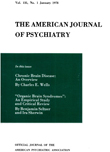COMPARISON OF EST AND ANTIDEPRESSANT DRUGS IN AFFECTIVE DISORDERS
Abstract
Because of limited temporal factors, it is difficult at present to compare the incidence of "long-term" remissions (2 years or more) in patients treated by EST and those treated with antidepressant drugs. In "psychotic" depressions, treatment relapses, as defined, are certainly not more frequent in drug-treated patients than in the EST group. In "neurotic" depressions, results, with respect to relapses, are definitely more favorable following drug therapy. Premature discontinuation of the drug will lead to a greater incidence of relapses. As a corollary to this, patients treated with drug therapy require more continued follow-up care than those treated by EST. Contrary to our earlier hopes, it is evident that drugs will not affect the recurrent pattern of affective disorders–no more than EST has done. The pattern of repetition of attacks varies greatly from one patient to another.
Access content
To read the fulltext, please use one of the options below to sign in or purchase access.- Personal login
- Institutional Login
- Sign in via OpenAthens
- Register for access
-
Please login/register if you wish to pair your device and check access availability.
Not a subscriber?
PsychiatryOnline subscription options offer access to the DSM-5 library, books, journals, CME, and patient resources. This all-in-one virtual library provides psychiatrists and mental health professionals with key resources for diagnosis, treatment, research, and professional development.
Need more help? PsychiatryOnline Customer Service may be reached by emailing [email protected] or by calling 800-368-5777 (in the U.S.) or 703-907-7322 (outside the U.S.).



